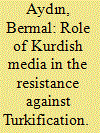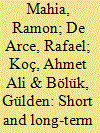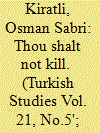|
|
|
Sort Order |
|
|
|
Items / Page
|
|
|
|
|
|
|
| Srl | Item |
| 1 |
ID:
175520


|
|
|
|
|
| Summary/Abstract |
Contemporary challenges in world politics, technology, economics, and social structures made suppliers of news significant for the Ottoman Empire in the nineteenth century. To preserve the Empire, policies that promoted centralization were pursued for decades. Improving transportation and communication systems was part of this centralization policy. However, because these technologies arrived in the Empire several years after its European counterparts founded, established, and extended these systems, it became dependent on foreign news agencies for supplying news. Finding their news biased and in favor of their home governments, Ottoman statesmen first tried to win them over by means of allowances and privileges, but enjoyed little success. As a result, the Empire founded the Ottoman Telegraph Agency. This article attempts to contribute to Ottoman press history by examining the creation of that agency.
|
|
|
|
|
|
|
|
|
|
|
|
|
|
|
|
| 2 |
ID:
175521


|
|
|
|
|
| Summary/Abstract |
Using the augmented version of the Blanchard-Perotti’s SVAR model, this article seeks to estimate the size of fiscal multipliers in Turkey for the period 2002:q3–2016:q2. Unlike many previous papers that use aggregate data in estimating the size of the fiscal multiplier, we use disaggregated data on taxes and government spending for the same purposes. Our empirical findings indicate that the size of the short-run fiscal multipliers for taxes much differs from that of government spending. Depending on the disaggregated tax and government spending instruments, it ranges from −0.83 to −0.27 for taxes, and from 0.02 to 0.98 for government spending, respectively. Overall, these findings corroborate the idea that a shock to taxes produces a non-Keynesian effect on GDP whereas government spending creates a (weak) Keynesian effect.
|
|
|
|
|
|
|
|
|
|
|
|
|
|
|
|
| 3 |
ID:
175519


|
|
|
|
|
| Summary/Abstract |
Kurds are the largest minority group in Turkey and their position is one of conflict with the ‘Turkishness Contract,’ a concept that describes the unspoken convention ensuring the ethnic privilege of Sunni-Turks and the exclusion or assimilation of those who resist Turkification. Kurds have thus experienced oppression since late Ottoman times and throughout the Republican years, up to the present day. This article suggests that the Kurdish media in Turkey have always had to negotiate state oppression by articulating a strategy of resistance to the hegemonic knowledge imposed by the state and reproduced by the mainstream media. They thus reject the Turkification that would be required to abide by the Turkishness Contract. This article's investigation of the Kurdish media takes place through an exploration of an online news platform, a self-proclaimed ‘voice of the weak.’ The data were collected through semi-structured in-depth interviews with journalists and editors of the platform.
|
|
|
|
|
|
|
|
|
|
|
|
|
|
|
|
| 4 |
ID:
175516


|
|
|
|
|
| Summary/Abstract |
This article presents the results of a simulation on the short-, medium- and long-term aggregated economic contribution of Syrian refugees on the Turkish economy. The simulation is focused on two sources of impact: refugees’ access to the Turkish labor market and the investment flow generated by Syrians inside the country. An input–output approach is used to compute economic effects considering the intersectoral linkages of the Turkish economy, thereby expanding the focus of a classic impact study. Our results show a positive economic impact of Syrian refugees of around 2 percent of GDP in the short term and 4 percent in the long term. Syrian immigration in Turkey is becoming a factor of economic dynamism that not only benefits the Syrian community itself but also the Turkish host communities. The direct and indirect contribution in terms of production and demand is very relevant and, properly channeled and promoted, can become a relative advantage for the country and not a burden of care.
|
|
|
|
|
|
|
|
|
|
|
|
|
|
|
|
| 5 |
ID:
175518


|
|
|
|
|
| Summary/Abstract |
Through an original survey experiment on a nationally representative sample of the Turkish population, this article demonstrates that respondents who are primed on the immorality of the use of force against others are substantially more willing to support only conditional military intervention in a civil war in another country. Further statistical analyses reveal that the activation of moral beliefs largely depends on the degree of approval of the moral statement and previously held foreign policy predispositions on isolationism. These findings contribute to the research on priming and public opinion regarding the use of force in general and, in particular, interventions in civil wars.
|
|
|
|
|
|
|
|
|
|
|
|
|
|
|
|
| 6 |
ID:
175517


|
|
|
|
|
| Summary/Abstract |
This study contextualizes the foreign policy strategies of Turkey and its responses to the two most recent mass refugee flows from Iraq (1989–1991) and Syria (since 2011). Considering migration policy as part of foreign policy, we argue that the foreign policy strategy of a receiving country toward a refugee-sending country is decisive in determining policies adopted for refugees. While the cases stress humanitarian need as a legitimizing tool to mobilize international coalitions to establish safe havens, the Iraqi case, however, did not correspond with any goal of using the refugee inflow to affect Iraq’s domestic policies. Therefore, the strategy focused on strict containment of refugees at camps and repatriation. In the Syrian case, the strategies simultaneously utilize idealistic and pragmatic paradigms to assert Turkey’s involvement in matters in Syria, while maintaining an emphasis on security that has become exclusionary over time.
|
|
|
|
|
|
|
|
|
|
|
|
|
|
|
|
|
|
|
|
|